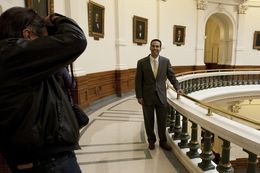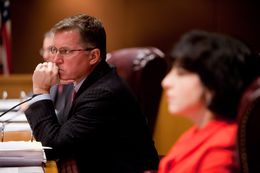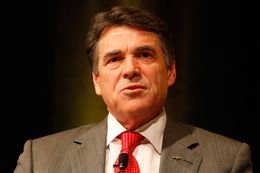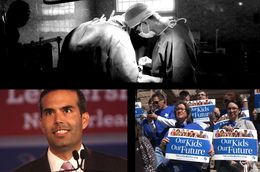
Someone with a sharp pencil could probably hang a dollar amount on the political value of a well-known name. Suffice to say it’s easier to get started if someone else has done the work that would otherwise go into making a name for George P. Bush.
As it is, he starts with the advantage of huge and mostly positive name ID in a state where that’s an expensive thing to acquire. Just look at Greg Abbott, as an example: Three statewide runs for office and in the latest University of Texas/Texas Tribune poll, 29 percent had no opinion or impression of him, and another 24 percent said they view neither favorably nor unfavorably.
Branding is hard.
The latest Bush has to define himself for voters who, left alone, will attach what they like and don’t like about his political forebears to him. That’s easier than doing those things while also trying to get people to remember your name.
And his declaration for land commissioner this week clears the way for everyone else. Nobody wanted to be the pol who got into a race for something only to have a Bush show up with a claim. Better to have him locked into something — anything — so that running statewide in the Republican primary isn’t complicated by a dynast.
Why declare now? Depends on who you ask. Land Commissioner Jerry Patterson, who got a heads-up call from Bush about what office he will seek, said it’s hard to stay on message when everyone else is speculating about what you might do. Those musings among the civics set ran from land to attorney general and even to governor. It was distracting. One argument against a declaration is that money might flow more freely into the political accounts of someone who could be running for anything. You might be giving to a governor, or an AG.
With the announcement, Bush can redouble his already hyperactive fundraising efforts. He had already raised nearly $1.4 million by the end of 2012. And since he doesn’t hold office now, he is not restrained, as others are, from raising money during the legislative session. Fundraising flotsam and jetsam provides evidence of fundraisers from the Rio Grande Valley to Georgia; Bush’s July report could be full of commas after the dollar signs.
It’s early to say the 2014 ballot is shaping up, but it’s also true that the primary is now one year away. With Bush locked in, others can queue up. Talk on the Democratic side has been muted. On the Republican side, here’s the state of play:
- Gov. Rick Perry and Attorney General Abbott have an understanding, at least according to Perry, that they won’t run against each other for governor. Neither has said he won’t run, and this potential race seems to be the favorite parlor game in politics right now. Perry loves being underestimated. Abbott has scads of money. They share a lot of big donors.
- Lt. Gov. David Dewhurst is still suffering from his loss to Ted Cruz in last July’s Republican primary. Whether he’ll run for another term, drop out, or run for something else — governor? U.S. Senate? — is an open question. Patterson, Agriculture Commissioner Todd Staples and Comptroller Susan Combs have all expressed interest in running for Dewhurst’s job. Patterson and Staples are openly working on it, Combs less so.
- Dewhurst isn’t the only Texas Republican who gets night sweats about Cruz. U.S. Sen. John Cornyn is acting like a guy who thinks he’ll be challenged in his own primary in 2014, and the Dewhurst experience, for anyone with an imagination, provides all the rationale a worrier might need. No real names have surfaced, however.
- If Abbott runs, his spot is open. Rep. Dan Branch, R-Dallas, who has also talked about lieutenant governor, has put his name in the hat. Bush had, too, until he locked in the land thing. Dale Wainwright, who left the Texas Supreme Court (where the last two AGs, Abbott and Cornyn, matriculated), is possible. Until Abbott’s intentions are clear, the talk about a successor will probably remain vague. Abbott’s long tenure, unlike Perry’s or Dewhurst’s, has not generated conversation about possible challengers.
- If the comptroller’s job is open, Sen. Glenn Hegar, R-Katy, Rep. Harvey Hilderbran, R-Kerrville, and former gubernatorial candidate Debra Medina are among those who might be interested.
- Rep. Charlie Geren, R-Fort Worth, is looking at agriculture if Staples moves on.
That is, at best, a partial listing. All of it will change a dozen times as current officeholders’ intentions become clear and candidates ambitions, strengths and weaknesses are revealed. The pent-up ambitions are strong, what with record-setting tenures underway in the governor’s and attorney general’s offices, and others who haven’t moved up or out as a result.
If the logjam breaks, who knows who’ll show up?










